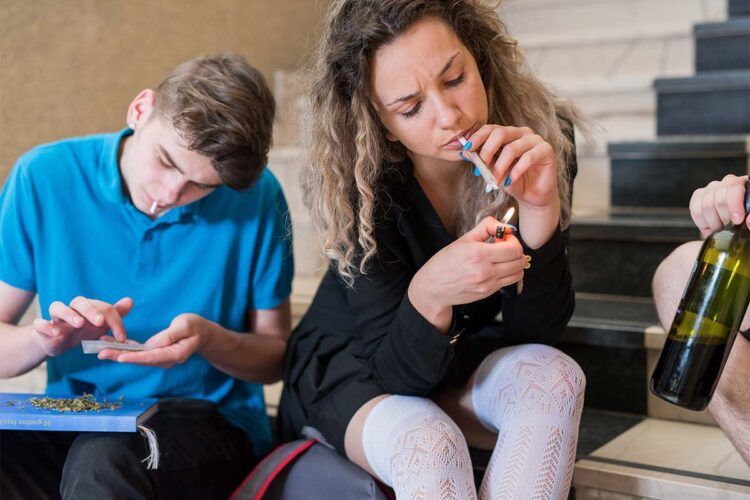It can be terrible to watch a loved one going through a severe addiction. Learning the telltale signs of substance abuse is the best way to prevent addiction and help anyone you know who may be suffering.
Substance abuse is different from addiction in the way that it is often the first step towards addiction. Abusing a substance can cause chemical imbalances in the brain that may prevent rational thinking, eventually leading to addiction, making it even more critical to identify substance abuse as early as possible.
According to addictionrehabtreatment.com, you can get help to identify substance abuse and other issues quickly, and you don’t have to struggle alone.
People can abuse any substance, but some drugs carry a higher risk of addiction and dependency. Identifying substance abuse early on will increase your chances of preventing a loved one from becoming addicted.
When dealing with someone who is currently abusing a drug, here are some warning signs to look for and what to expect.
Signs of Drug Addiction

Every person’s situation is different, but there are general signs of substance abuse you can look out for in our list below. Taking note of any behavioral changes could help prevent your loved ones from making some terrible decisions that cause them to become addicted. Keep an eye out for the following;
- Struggling in school with grades and social activities
- Bad punctuality, appearing tired or disinterested and performing poorly.
- Poor hygiene and lack of interest or care for personal appearance.
- Change in behavior, including an increased emphasis on privacy.
- Significant changes in relationships.
- Fatigued when performing everyday activities.
- Irresponsible spending.
- Loss of appetite.
- Discolored skin tone, bloodshot eyes, and tired appearance.
- Defensive attitude when asked about substance use.
Signs of Alcohol Issues and Abuse

One of the most abused substances is alcohol. Alcohol addiction and alcoholism have various signs and symptoms that can be difficult to spot in some people. These symptoms may be hidden or minimized by functional alcoholics, but the problem becomes more difficult to conceal with time.
Alcohol abuse can result in many symptoms ranging from blackouts and memory loss to flushed skin, broken capillaries, and trembling hands. Long-term abuse of alcohol can result in chronic diarrheas with the possibility of vomiting blood.
Another sign of alcohol abuse occurs when the individual does not consume alcohol when they usually, and they begin to show signs of withdrawal. The most common symptoms of withdrawal include headaches, nausea, insomnia, and anxiety. If left unmonitored, the withdrawal process can cause severe damage with the possibility of delirium tremens (DTs). This condition can lead to hallucinations and life-threatening seizures.
If you or a loved one is considering detoxing from alcohol or any substance, medical detox is required to ensure that the process is carried out safely and successfully.
How to Spot Drug Use in Teens

Moodiness can often be overlooked as a symptom of becoming a teenager. Still, drug abuse can replicate that behavior and create more drastic changes, including acting withdrawn, tired, depressed, or hostile.
Key signs to look out for are when a child starts to hang out with a different friend group, misses or skips school often, or their sleeping and eating patterns begin to change. Changes in peer groups can often be linked with substance use as they are more likely to be influenced or encouraged by specific groups of friends.
If you suspect that your friend, child, or loved one is using and abusing drugs or alcohol, immediate intervention is encouraged. Parents can receive support and advice from counselors, primary care physicians, and drug abuse treatment providers.
What to look out for – Specific Drugs

1. Marijuana/Cannabis
Many take marijuana in search of a particular euphoric feeling that will rarely go unnoticed. Cannabis-based products, such as edibles, may contribute to this desired feeling. If the individual appears forgetful and uncoordinated, the most likely reasoning would be that the cannabis has heightened their visual and auditory perceptions.
Another common symptom of marijuana usage includes an increased appetite with specific cravings. They may begin to react a lot slower to things, become very paranoid and very suspicious of everyone and everything around them. Keep an eye out for bloodshot eyes, droopy eyelids, and a very mellow demeanor.
Marijuana is yet to be proven as addictive but the desired high that many uses is highly addictive and can result in substance abuse.
2. Stimulants
Those who use stimulants often experience varying mood and behavior changes. They appear aggressive and ramble on when talking. Their pupils will most likely be dilated. They’ll be highly energetic and have a high-speed breathing rate.
Some may even exhibit hostility and paranoia. When snorted, stimulants can cause nasal congestion, with drugs such as cocaine causing severe damage to the mucous membrane inside the nose.

3. Opioids
Opioids come in the form of prescription painkillers but can also be in the form of an illicit drug known as heroin. Opioids cause the person to act sedate, become forgetful, lack focus, have delayed responses, and appear lethargic.
Using opioids can slow the digestive system and therefore cause constipation and other intestinal issues when abused heavily. Individuals will become anxious and display flu like symptoms when separated from the drug for an amount of time.
4. Club Drugs
If the person you are concerned about spends a lot of time going out to parties and clubs, you must familiarize yourself with the signs of club drug abuse. Club drugs come in the form of ecstasy, ketamine, and GHB.
The symptoms of club drug abuse include a high body temperature, absence of coordination, dizziness, sweating, and slurred speech.
Knowing the signs and common symptoms of drug abuse will help you keep a loved one from slipping further into the trap of substance abuse, which can lead to addiction.
 Hi Boox Popular Magazine 2024
Hi Boox Popular Magazine 2024



